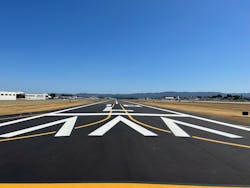Van Nuys Airport Celebrates Completion of $13 Million Runway Reconstruction, Start of Unleaded Fuel Availability
Los Angeles World Airports (LAWA) celebrated the reopening of the newly reconstructed Runway 16L/34R at Van Nuys Airport (VNY) Monday, August 8, completing part of a $13.1 million project to improve the safety of the airfield facilities that make VNY a world-class general aviation airport.
Reconstruction work began in late February and lasted six months, during which the entire 4,000-foot length of the airport’s shorter of two runways was rebuilt to extend the runway’s lifespan for another two decades. Enhancements also were made to the taxiway, which included the installation of LED-lighting, airfield signage and surface markings, and the addition of an engine run up safety area adjacent to the runway.
“As one of the busiest general aviation airports in the country, Van Nuys Airport is proud to provide our tenants and visitors with facilities that will enhance safety and efficiency for decades to come,” said Justin Erbacci, Chief Executive Officer for LAWA. “From offering more sustainable fuels and on-site solar power, to investing in our airfield infrastructure, we are creating the most sustainable and desirable general aviation airport in the world."
As part of LAWA’s commitment to making general aviation more sustainable, the runway’s base was reconstructed out of 100% recyclable materials. Additionally, the project will install a total of 167 new LED high efficiency runway lights to replace the existing incandescent units, which will reduce the electrical demand at the airport. The updated lighting will enhance airfield safety by improving the visibility of the runway environment.
"Los Angeles World Airports has made industry-leading commitments to creating and operating the most sustainable airports in the world," said Los Angeles Board of Airport Commissioners member Nicholas P. Roxborough, who represents the Van Nuys area. "Our investments to incentivize the adoption of unleaded fuel at Van Nuys Airport is another important piece of our long-range strategy to achieve our bold agenda and to be a good neighbor to the surrounding community."
During the project, an incredible 43.4% of the crews were local workers, which far exceeds LAWA’s goals of 30% local hires on all capital projects. More than 76,000 hours of work went into reconstructing the runway.
This runway project has particular importance for helping to develop future pilots who rely on 16L/34R for flight school training, and for life-saving flight operations that are based at VNY. In a ceremonial first flight today, a pilot with the VNY-based Hot Shot Aviation flight school took off from RWY16L using a 1979 Cessna 152. The aircraft was specially modified and certified to use new UL94 unleaded fuel designed for piston-powered aircraft. This more environmentally sustainable fuel option recently became available at VNY for the first time and now is available for pilots and operators to choose for certified aircraft. VNY and LAWA are encouraging operators to adopt wider use of unleaded aircraft fuel to help support the airport's sustainability goals and reduce the environmental impact of piston-powered aircraft using legacy fuel types. The Cessna that conducted today's ceremonial first flight was fueled with unleaded UL94 and helps demonstrate that even older aircraft can take advantage of new fueling technology.
"LAWA’s investment in this runway asset, together with the commitment of its tenant business partners at VNY who are leading efforts to introduce environmental improvements, maximizes the airport’s status as a leading center for new industry pilots, jobs and positive economic benefits to the City of Los Angeles," said Curt Castagna, president of the Van Nuys Airport Association.
The runway reconstruction project was coordinated closely with the Federal Aviation Administration (FAA) and was funded by federal grants that will reimburse the cost of the reconstruction and improvements. The project is managed by LAWA’s Development Group with HNTB Corp. serving as engineer-of-record and Sully-Miller Contracting Co. as general contractor.

